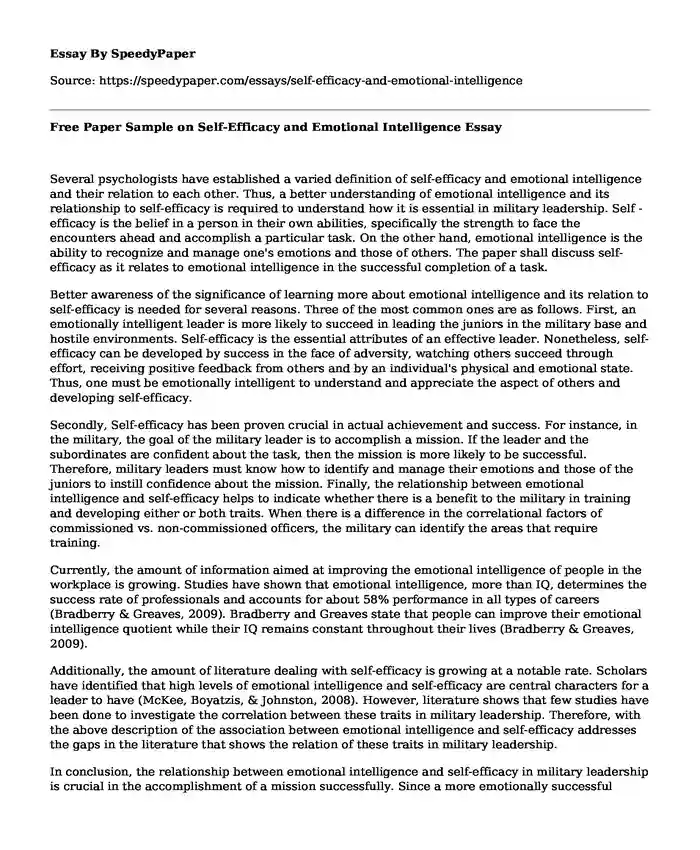
| Type of paper: | Research proposal |
| Categories: | Leadership development Emotional intelligence |
| Pages: | 3 |
| Wordcount: | 622 words |
Several psychologists have established a varied definition of self-efficacy and emotional intelligence and their relation to each other. Thus, a better understanding of emotional intelligence and its relationship to self-efficacy is required to understand how it is essential in military leadership. Self -efficacy is the belief in a person in their own abilities, specifically the strength to face the encounters ahead and accomplish a particular task. On the other hand, emotional intelligence is the ability to recognize and manage one's emotions and those of others. The paper shall discuss self-efficacy as it relates to emotional intelligence in the successful completion of a task.
Better awareness of the significance of learning more about emotional intelligence and its relation to self-efficacy is needed for several reasons. Three of the most common ones are as follows. First, an emotionally intelligent leader is more likely to succeed in leading the juniors in the military base and hostile environments. Self-efficacy is the essential attributes of an effective leader. Nonetheless, self-efficacy can be developed by success in the face of adversity, watching others succeed through effort, receiving positive feedback from others and by an individual's physical and emotional state. Thus, one must be emotionally intelligent to understand and appreciate the aspect of others and developing self-efficacy.
Secondly, Self-efficacy has been proven crucial in actual achievement and success. For instance, in the military, the goal of the military leader is to accomplish a mission. If the leader and the subordinates are confident about the task, then the mission is more likely to be successful. Therefore, military leaders must know how to identify and manage their emotions and those of the juniors to instill confidence about the mission. Finally, the relationship between emotional intelligence and self-efficacy helps to indicate whether there is a benefit to the military in training and developing either or both traits. When there is a difference in the correlational factors of commissioned vs. non-commissioned officers, the military can identify the areas that require training.
Currently, the amount of information aimed at improving the emotional intelligence of people in the workplace is growing. Studies have shown that emotional intelligence, more than IQ, determines the success rate of professionals and accounts for about 58% performance in all types of careers (Bradberry & Greaves, 2009). Bradberry and Greaves state that people can improve their emotional intelligence quotient while their IQ remains constant throughout their lives (Bradberry & Greaves, 2009).
Additionally, the amount of literature dealing with self-efficacy is growing at a notable rate. Scholars have identified that high levels of emotional intelligence and self-efficacy are central characters for a leader to have (McKee, Boyatzis, & Johnston, 2008). However, literature shows that few studies have been done to investigate the correlation between these traits in military leadership. Therefore, with the above description of the association between emotional intelligence and self-efficacy addresses the gaps in the literature that shows the relation of these traits in military leadership.
In conclusion, the relationship between emotional intelligence and self-efficacy in military leadership is crucial in the accomplishment of a mission successfully. Since a more emotionally successful leader is more likely to succeed in a task through instilling of confidence and identification of areas that require military training, emotional intelligence and Self-efficacy are crucial for military leadership. A study by Bradberry and Greaves indicate that emotional intelligence quotient accounts for 58% of performance in every career . Therefore, the two traits must work with the help of the other to achieve the success of a mission in military leadership.
References
Bradberry, T., & Greaves, J. (2009). Emotional Intelligence 2.0. San Diego, CAL: TalentSmart.
McKee, A., Boyatzis, R. E., & Johnston, F. (2008). Becoming a resonant leader: Develop your emotional intelligence: Renew your relationship: Sustain your effectiveness. Boston, MA: Harvard Business School Press.
Cite this page
Free Paper Sample on Self-Efficacy and Emotional Intelligence. (2022, Feb 16). Retrieved from https://speedypaper.net/essays/self-efficacy-and-emotional-intelligence
Request Removal
If you are the original author of this essay and no longer wish to have it published on the SpeedyPaper website, please click below to request its removal:
- Free Essay on Physical Environment in the Kindergarten and the Creativity of Stusents
- Essay Example on the Video about Legalizing Marijuana
- Essay Sample on the Impact Violent Video Games Have on Children's Behavior
- Essay Sample: Kessler-Harris and Joan Scott's Contribution to Gender Studies
- Lost in Life: Experiencing Identity Diffusion Post High School. Paper Example
- Free Paper on Hyundai and Its Sales Performance in 2018
- Free Essay on The Outcome Assessment of SEL among Students
Popular categories




